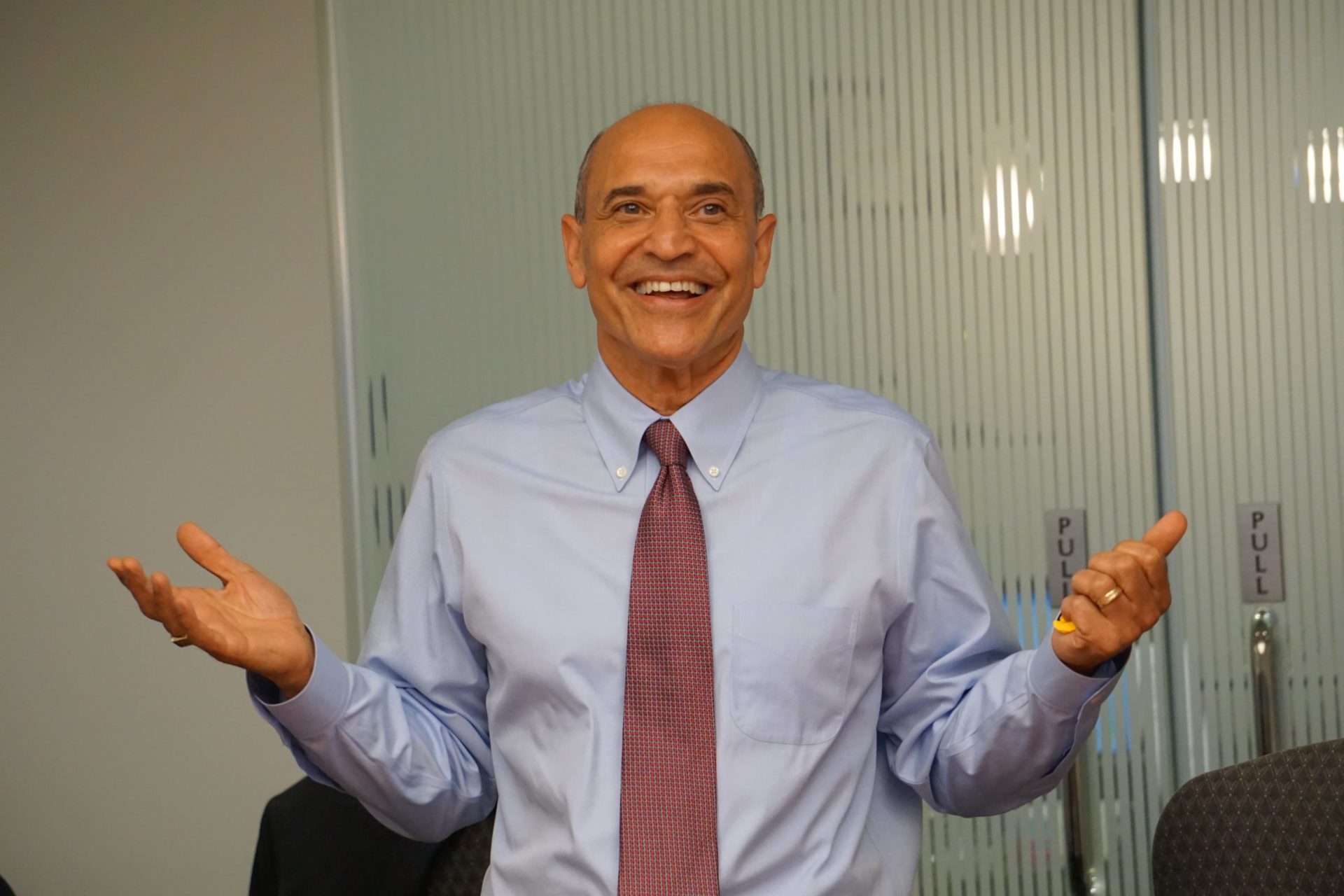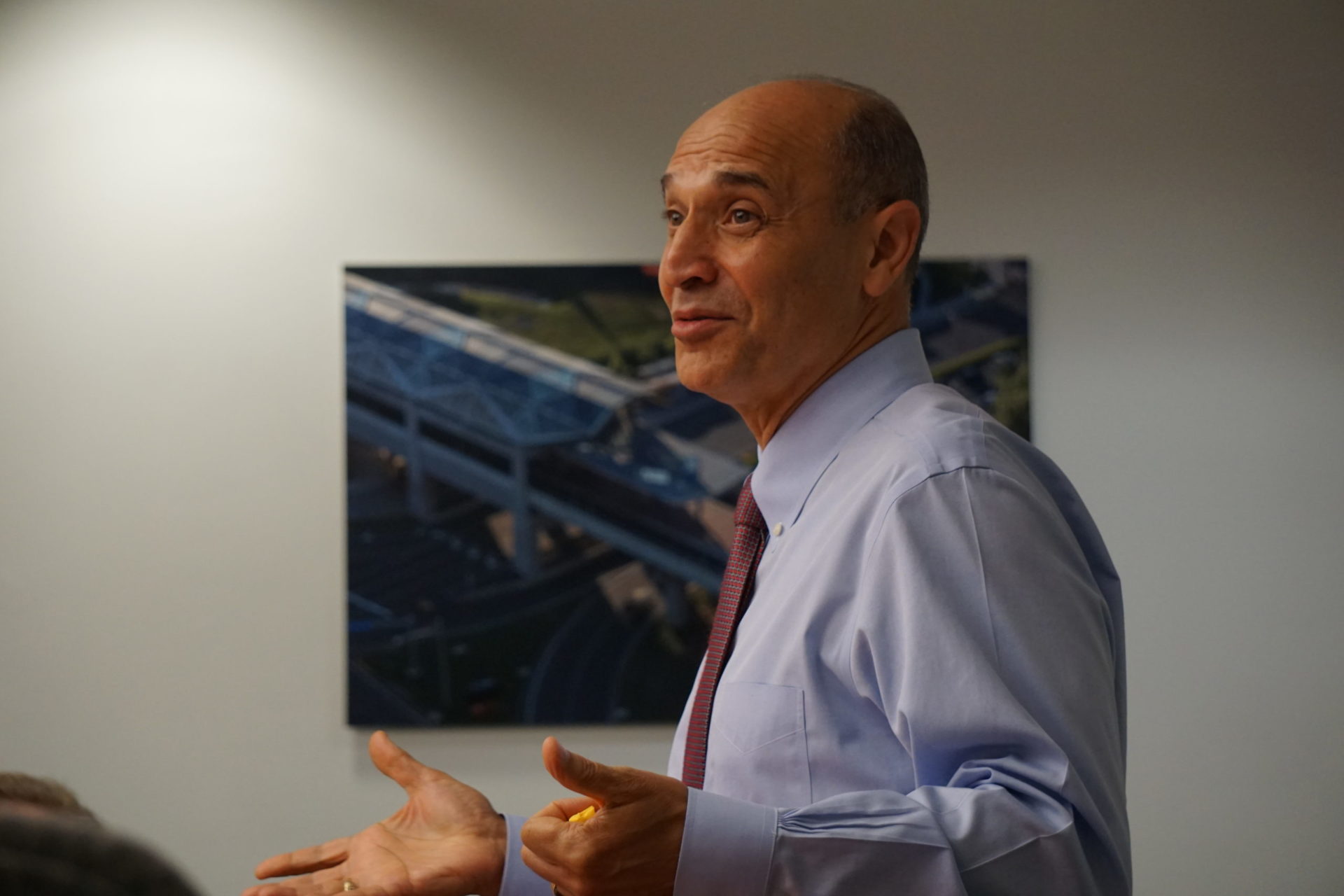E-Newsletter
Getting to know Victor Hoskins and his vision as the next president and CEO of the Fairfax County EDA
When Victor Hoskins was introduced as the next president and CEO of the Fairfax County Economic Development Authority, he tossed out some revelations and showed off his trademark enthusiasm for his chosen profession.
He told the FCEDA staff that he’d grown up on the south side of Chicago, the youngest of six children to an Italian mother and an African-American father who would die before Hoskins turned 1. He talked about his love of music (especially jazz), walking the less-traveled streets of major cities and photographing them, and spending time with his family — in particular his grandchild.
Most of all, he talked about his love for economic development, mentoring a staff and seeing big plans come to fruition. Hoskins was excited to learn that his new corner office is a quick walk from the Greensboro Metro Station in Tysons. E-Bird Extra got a chance to learn about the new boss and his some of his thoughts before he settles into his role this Monday, August 5.
E-Bird Extra: What are three things that people don’t know about you?
Victor Hoskins: Number one, I am an old-movie enthusiast. My wife and I have about 1,500 movies in our collection and the majority of them are from the ’30s and ’40s. We love a lot of the classics. On the music side, I’ve been a jazz enthusiast my whole life and we recently went to the Montreux Jazz Festival in Switzerland, which is kind of the pinnacle for jazz. The third thing is that I love cities. I walk around cities when I’m on vacation — London, Paris, etc. — and I have thousands of photos of places I love seeing or would like to create.
EE: Do you have a philosophy that you follow as an economic developer?
VH: I love economic development. It’s actually not only what I do as a profession but it is my hobby. I enjoy the entire development process. I’ve been very fortunate that I’ve worked in the public sector and the private sector. But the most important thing I’ve done has really been to coach winning teams. I think of myself as a person that is innovative and who creates innovative ideas…but what I’ve found is that my team always creates more. I look to them to really shape the organization.
EE: You’re leaving Arlington County. What attracted you to the Fairfax County job?
VH: The way I look at the world, it’s about challenges. When I came to Arlington, the mission was to tackle the (office) vacancy rate and bring jobs back…I feel like the challenge in Arlington has been met with one of the biggest wins in the history of economic development. Now, I’m coming here for a different kind of challenge. One reason I was attracted to Fairfax County is its size. It’s the largest jurisdiction in the commonwealth, actually one of the largest in the entire mid-Atlantic region. That size makes the magnitude of problems more complex and I like dealing with complex problems. At 120 million square feet, it’s three times the office market of Arlington. It’s 400 square miles and Arlington is 26 square miles. It has a population of nearly 1.2 million and the population of Arlington is 229,000. So, it’s a different scale. It’s also a market, which I believe, has tremendous potential and I believe is at the precipice of executing on that potential. I want to be part of that.

Victor Hoskins was all smiles as he met the FCEDA staff for the first time. (Photos, FCEDA)
EE: What are the primary challenges for you in Fairfax County?
VH: The challenges that I see in Fairfax County are really challenges that most of the world’s larger metro markets face. This is to retain talent, retrain talent, to grow talent and to attract talent. We have had 10 years of unprecedented economic growth in the United States and that has strained labor markets. Plus, the industries have changed: Ed tech, med tech, clean tech, big data, cybersecurity, AI. It’s all common language for us now. Today, people talk about data science and data analytics like they talk about cornflakes. In Northern Virginia, we have roughly 50,000 open positions in tech fields right now. We need to fill those positions.
EE: So your first mission here will center around workforce issues.
VH: There are basically four things we need to focus on. One area will be in terms of retaining talent. We lose a lot of our technical engineers to other markets around the country. In a way, our graduates are actually feeding other markets. We need to turn that around. The second would be retraining. We’re dealing with a lot of people in our workforce who may be interested in career transition, (for example) maybe moving from accounting into coding. The third will be actually growing the talent — working with our universities and with our companies to design programs that fulfill the vision of a talent pipeline. We need to work directly with our companies, understand their needs. The fourth is attracting talent from places around the world — looking for talent that will fill the needs of our companies.
EE: So, it’s really about making sure that Fairfax County is a place where people — especially young, working people — want to live and work.
VH: Place-making today is one of the key elements of an ecosystem that is not just attractive but someplace that people want to experience. I think of the Capital Riverfront. At one time, hardly anyone went to Capital Riverfront in Washington, D.C. Now people take their wedding pictures on a bridge that was designed in Capital Riverfront. You can go there and you have to fight your way into the fountain with the kids. This is what people are looking for these days: places of experience that they can access for free. And I think that’s one of the exciting opportunities we can create here.
EE: What is your vision for creating those kind of places in Fairfax County?
VH: The District of Columbia in 2011 didn’t have as many wonderful places as it has now, and I was very fortunate to be part of creating those, working with developers on places like City Center, Union Station, The Wharf, City Market, O Street Market. We can do the same thing all over this county. You can create these places but you have to do them with a purpose and think about how they’re designed, how people interact with them and how they differentiate themselves from other markets…Some of the most exciting opportunities, I believe are the Metro stations. The great thing is when you build in and around Metro stations, you actually reduce the number of car trips. Millennials don’t like to own cars. We want to create a place where they don’t have to own cars We really need to do take our transit stations and make them better places for millennials and Generation Z…Those Metros stations weren’t here 10 years ago. Now you have stations that are going to lead to the primary international airport of our region. That is a huge opportunity.

Hoskins’ first visit to FCEDA headquarters provided a chance to share a bit about his background.
EE: You touched on the importance of collaboration to make the best projects happen. Can you discuss your philosophy of placing cooperation ahead of competition when dealing with other local jurisdictions?
VH: I believe that the most successful regions in the future will actually be regions that work together, where each jurisdiction has its own niche and uses that niche as part of a team to attract companies and grow companies to build their communities. One of the great things about Northern Virginia is there is already a natural kind of acuity of working together. In the last four or five years (Arlington has) been able to work very closely with Alexandria, a little bit with Fairfax County, Prince William County. We’ve actually done events together, marketing together. But we need to do more of that and do it with more purpose, and we need to do it involving our companies and our universities directly.
EE: Why was attracting Amazon a win for all of Northern Virginia?
VH: It’s about transformation in the sense that it will give us the chance to really move away from government and more toward commerce and innovation. The study that Stephen Fuller did for GMU talks about where the employees will come from. Of the 25,000 jobs they’re predicting, about 33 percent will go to residents of Fairfax County…The bottom line is that the whole region is going to benefit.
EE: You mentioned innovation. How does that apply to your perception of Fairfax County?
VH: This is one of them most innovative environments in the country. If it wasn’t for your work in defense research, you wouldn’t have GPS. Most of the stuff on your iPhone wouldn’t work. The Internet was invented here. This has been a place of innovation. What we’re trying to do now is really recapture the private part of that innovation and the excitement to draw talent in.
EE: How are things changing in the world of economic development?
VH: Economic development has changed quite a bit in the last decade, decade-and-a-half. In particular, the competition has gone from regional or maybe even coastal or bi-coastal to really an international competition. Today, we compete as much with London and Paris and Berlin, Shanghai, Bangalore as we do with Los Angeles, San Francisco or Boston/Cambridge. The only way you can really win in this competition is by working as a region — by functioning as a region. We have 6 million people in this region with 3 million in our workforce. If we can harness that power and work as a region we will have no competitors.
News Travels Fast
Stay ahead of the curve with the latest business news from Northern Virginia. Receive updates on moves, incentives, workforce, events and more.